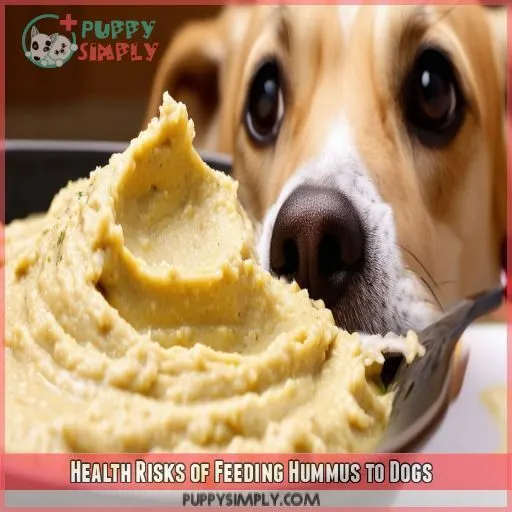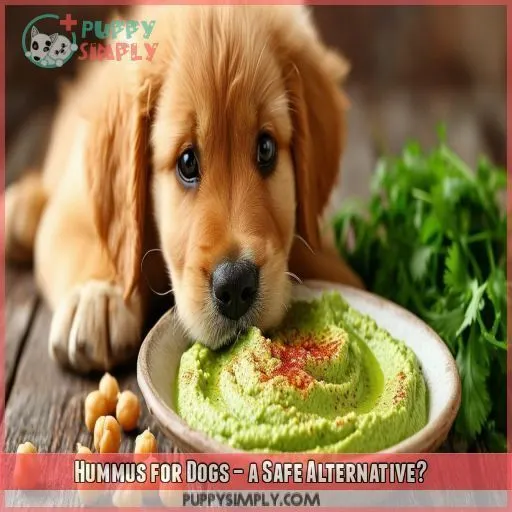This site is supported by our readers. We may earn a commission, at no cost to you, if you purchase through links.

Hummus contains several ingredients that can be harmful to dogs, including garlic and lemon juice.
Additionally, hummus is high in fat and sodium, which can lead to health issues for your pup.
If you’re looking for a safer alternative, consider offering your dog plain mashed chickpeas instead.
If you want to learn more about the risks of feeding hummus to your dog and explore some dog-safe alternatives, keep reading.
Table Of Contents
- Key Takeaways
- Can Dogs Eat Hummus Safely?
- What is Hummus Made From?
- Health Risks of Feeding Hummus to Dogs
- Hummus for Dogs – a Safe Alternative?
- What to Do if My Dog Eats Hummus
- Can Dogs Eat Store-Bought Hummus?
- Is It OK for Dogs to Eat Hummus?
- Share Your Experience With Hummus and Dogs!
- Frequently Asked Questions (FAQs)
- What happens if my dog eats hummus?
- Why can’t dogs have chickpeas?
- Can dogs eat tahini?
- Can dogs have babaganoush?
- How much hummus is too much for a dog?
- Can dogs eat hummus with pita bread?
- What are the long-term effects of hummus consumption in dogs?
- Are there any benefits to feeding my dog hummus?
- Why do dogs like hummus?
- Conclusion
Key Takeaways
- Hummus is a no-go for dogs due to the harmful effects of ingredients like garlic and lemon juice.
- High-fat and sodium levels in hummus can lead to health issues like weight gain, pancreatitis, and heart problems.
- Plain, garlic-free, and lemon-free hummus in small amounts might be okay, but it’s not the best option.
- Stick to dog-safe treats like plain mashed chickpeas, which offer a range of essential nutrients.
Can Dogs Eat Hummus Safely?
So, can your dog eat hummus safely? The short answer is no, not really. While some ingredients in hummus are safe for dogs, others can be harmful or toxic, making it a tricky treat to navigate.
The Risks of Sharing Hummus
Hummus is a tasty treat, but is it safe to share with your pup? The short answer is no. Hummus often contains garlic, which is toxic to dogs and can cause serious health issues.
Garlic Toxicity Explained
Garlic is a big no-no for dogs. It contains thiosulfate, which attacks their red blood cells, leading to a condition called hemolytic anemia. This can cause:
- Dark urine
- Jaundice
- Lethargy
- Pale gums
- Rapid breathing
High Sodium Content Concerns
Hummus can be high in sodium, which is a concern for dogs, especially those with heart conditions. Too much sodium can lead to health issues. It’s best to offer low-sodium alternatives and always consult your vet about your dog’s unique dietary needs.
Digestive Issues and Obesity
Hummus is a calorie-dense food, so it’s easy for your dog to overindulge and consume too many calories, leading to weight gain and obesity. Obesity is a serious health concern for dogs and can cause joint problems, respiratory issues, and even shorten their lifespan. Here are three key considerations:
- Calorie Control: Hummus is high in calories, and a small amount can quickly add up.
- Portion Size: A little hummus goes a long way for dogs.
- Balanced Diet: Remember, hummus shouldn’t replace your dog’s regular meals.
What is Hummus Made From?
Before we get into whether or not dogs can eat hummus, let’s take a quick look at what hummus is made of. This popular Middle Eastern dip or spread is crafted from a blend of mashed chickpeas, tahini (a sesame seed paste), olive oil, lemon juice, and various seasonings.
Chickpeas, the Main Ingredient
Chickpeas are the star ingredient in hummus, but what’s the deal with these little legumes? Well, chickpeas are generally safe for dogs and offer some nutritional benefits, like fiber, protein, potassium, magnesium, and folate. So, if your pup accidentally gobbles up some plain chickpeas, don’t stress too much. They might even thank you for the extra nutrients!
Tahini, a Healthy Fat Source
Tahini, a sesame seed paste, is a key ingredient in hummus. It’s a healthy fat source, providing protein and good fats for your pup.
Lemon Juice, a Potential Upset Stomach
While lemon juice isn’t toxic to dogs, it can cause an upset stomach. It’s best to avoid giving your dog citrus fruits or juices.
Garlic, a Toxic Ingredient for Dogs
Garlic is a big no-no for dogs. It’s toxic and can cause serious health issues. Even small amounts can be harmful, leading to anemia, vomiting, and diarrhea.
Olive Oil, a Calorie-Dense Addition
Olive oil is a key ingredient in hummus, adding healthy fats and a smooth texture. While it’s generally safe for dogs, it’s calorie-dense, so a little goes a long way.
Health Risks of Feeding Hummus to Dogs
Hummus is a tasty treat for humans, but it’s not always a safe snack for dogs. Let’s take a closer look at the potential health risks of feeding hummus to your furry friend and explore some alternatives.
Upset Stomach and Digestive Issues
N/A
High Fat and Sodium Content Concerns
Hummus is typically high in fat and sodium, which can lead to health issues for dogs, including:
- Weight gain
- Pancreatitis
- Heart problems
Risk of Food Poisoning From Garlic
Hummus is a tasty treat, but the garlic in it can be toxic to dogs, causing food poisoning. Keep an eye out for symptoms like dark urine, jaundice, lethargy, pale gums, and rapid breathing.
Potential Allergic Reactions to Chickpeas
While chickpeas are generally safe for dogs, some pups may have allergies to them or other hummus ingredients. Always monitor your dog for any signs of allergic reactions or digestive issues after eating hummus.
Hummus for Dogs – a Safe Alternative?
So, can your dog join in on the hummus fun? Let’s explore if and how your furry friend can safely enjoy this tasty treat.
Plain Hummus, a Moderation Treat
Plain hummus without garlic or onion is a safe bet for your dog. But remember, everything in moderation! Keep portions small and infrequent to avoid any tummy troubles.
Mashed Chickpeas, a Healthy Snack
While plain hummus is a tasty treat for your pup, you might be wondering if it’s healthy. Good news: mashed chickpeas offer a range of benefits. They’re packed with protein and fiber, plus essential nutrients like potassium, magnesium, and folate.
Variety is Key for a Dog’s Diet
- Dogs get bored of the same old chow.
- A varied diet helps your pup get a range of nutrients.
- Some dogs have allergies or sensitivities to certain foods.
- You can avoid weight gain and health issues by not overdoing it with treats.
Experimenting With Different Hummus Flavors
If you’re feeling adventurous, you can experiment with different hummus flavors for your furry friend. Here are some flavor combos to try:
| Flavor | Safe for Dogs? |
|---|---|
| Plain | Yes, in moderation |
| Roasted Red Pepper | No, potentially harmful |
| Jalapeno | No, too spicy |
What to Do if My Dog Eats Hummus
If your dog gets into the hummus, don’t panic. First, check the ingredients to see if there’s anything toxic to dogs, like garlic or onion. Then, monitor your dog for any signs of illness.
Stay Calm and Monitor Symptoms
If your dog sneaks a taste of hummus, don’t panic. Simply monitor them for any signs of illness and contact your vet if you’re concerned. Keep hummus out of paw’s reach.
Check the Ingredients for Toxicity
If your dog has eaten hummus, check the ingredients carefully. Garlic and onions are toxic to dogs, so keep an eye out for these ingredients when reviewing the hummus’s contents.
Contact Your Vet for Professional Advice
If you’re concerned, contact your vet. They’ll advise on next steps and any potential risks, ensuring your dog’s health and safety.
Prevent Future Incidents, a Priority
To avoid future hummus-related mishaps, take some simple precautions:
- Keep hummus out of paws’ reach. Store it on high shelves or in closed cabinets.
- Opt for dog-safe treats. Offer pup-approved snacks like plain, mashed chickpeas or dog-friendly fruits and veggies.
- Vet-proof your pantry. Consult your vet about dog-safe human foods and adjust your grocery list accordingly.
- Stick to dog food. While tempting, avoid sharing your snacks. Your dog’s diet should primarily consist of dog food formulated to meet their nutritional needs.
- Monitor like a hawk. If your dog sneaks a taste, watch for signs of stomach upset, allergic reactions, or other health issues.
Can Dogs Eat Store-Bought Hummus?
If you’re considering sharing store-bought hummus with your furry friend, it’s important to proceed with caution. While it may be tempting to let your dog indulge in this tasty treat, it’s important to remember that not all human foods are safe for canine consumption.
Choosing a Garlic-Free and Lemon-Free Hummus
If you’re thinking of sharing hummus with your furry friend, it’s important to choose a variety that’s free of garlic and lemon. Garlic is toxic to dogs and can cause serious health issues, so it’s a hard no-go. Lemon juice, on the other hand, isn’t toxic, but it can cause digestive upset and offers little nutritional value.
When browsing the store-bought hummus options, look for brands with minimal ingredients and steer clear of those containing onions or added salt.
The 90/10 Rule for Treats
For treats, follow the 90/10 rule: only 10% of your pup’s daily calories should come from snacks. Here are some tips for choosing store-bought hummus:
- Opt for brands with minimal ingredients.
- Avoid hummus that contains onions or added salt.
- Stick to plain hummus without garlic or onion as a safer option.
Avoiding Hummus Chips and Salty Snacks
While hummus itself is a no-go for your pup, what about those tasty hummus chips? Unfortunately, most hummus chips contain onions, which are toxic to dogs. Salty snacks are generally a bad idea for dogs due to potential health issues.
| Treat | Safe for Dogs? | Why or Why Not? |
|---|---|---|
| Hummus Chips | No | Usually contain onions, which are toxic to dogs. |
| Salty Snacks | Not Recommended | High in sodium and can lead to health issues. |
Is It OK for Dogs to Eat Hummus?
So, can dogs eat hummus? Well, it’s not toxic, but it’s not ideal either. Hummus contains ingredients that can upset your dog’s stomach and cause other health issues if consumed in large quantities.
In this section, we’ll explore the potential risks of feeding hummus to your dog and offer guidance on whether it’s safe to include in their diet.
The Importance of Moderation
If you decide to share hummus with your dog, remember that moderation is key. Offer only a small amount as a treat, and monitor your dog for any reactions.
Focusing on a Balanced Diet
A balanced diet is really important for your furry friend’s health and well-being. While hummus can be a tasty treat, it shouldn’t become a staple in your dog’s diet. Here’s why:
- Variety is key—dogs need a range of nutrients, so a balanced diet is important
- Nutritional needs—a balanced diet is made specifically for your dog’s age, size, and activity level
- Health considerations—some dogs have specific dietary requirements due to health issues
- The 90/10 rule for treats—hummus is a tasty treat, but it should only make up a small part of the 10% of daily calories that come from snacks
- Homemade meals give you control over ingredients and portion sizes, making it easier to make sure your dog gets a balanced diet
Hummus as a Treat, Not a Meal
Hummus is a tasty treat for your pup, but it shouldn’t replace their regular meals. Keep portions small and infrequent, and always monitor their reaction.
Consulting Your Vet for Professional Advice
Talking to your vet is always a good idea when it comes to your dog’s diet. They can give you advice and recommendations that are just right for your dog’s unique needs and health. Here are some reasons why consulting your vet is beneficial:
- Nutrition Plans Made Just For Your Dog: Every dog is different, and your vet can create a nutrition plan that’s perfect for your dog’s specific needs.
- Expert Guidance: Vets have the knowledge and experience to understand the ins and outs of dog nutrition, making sure your furry friend gets the best possible diet.
- Allergen and Toxicity Concerns: Vets can spot ingredients that might be harmful to your dog, helping you avoid potential health problems.
- Weight Management: Vets can advise on portion sizes and calories to keep your dog at a healthy weight, reducing the risk of weight-related health issues.
Share Your Experience With Hummus and Dogs!
Have you ever shared hummus with your dog? What was their reaction? We want to hear about your experiences and any tips you might’ve for other dog owners out there.
Have You Ever Shared Hummus With Your Dog?
Have you ever shared hummus with your dog? Did they gobble it up or turn their nose up? Were there any tummy troubles or happy tails? Share your story in the comments!
What Happened When Your Dog Ate Hummus?
So, what happened when your dog got a taste of hummus? Here are some possible reactions:
- They might’ve loved it and begged for more
- Perhaps they’d an upset stomach or showed signs of digestive issues
- In rare cases, they could’ve experienced more severe symptoms like vomiting or diarrhea
Tips for Sharing Hummus With Your Dog Safely
If you’re keen to share hummus with your furry friend, stick to plain hummus without garlic or onion. Keep portions small and always monitor your dog for any signs of digestive upset or allergic reactions.
Frequently Asked Questions (FAQs)
What happens if my dog eats hummus?
If your dog eats hummus, they might experience an upset stomach or, in more serious cases, weight gain or pancreatitis. Garlic, a common ingredient in hummus, is toxic to dogs and can lead to health issues like anemia.
Why can’t dogs have chickpeas?
While chickpeas are safe for dogs to eat, they must be cooked and plain. Canned chickpeas often contain high levels of sodium, which can be harmful to dogs.
Can dogs eat tahini?
Yes, dogs can eat tahini. It’s a safe, non-toxic treat, but only in moderation. Tahini is a good source of healthy nutrients, but dogs are carnivores and do best on meat-based diets.
Can dogs have babaganoush?
Technically, dogs can eat babaganoush. But it’s best to avoid store-bought babaganoush, which often contains garlic, a member of the Allium family, which is toxic to dogs. Make your own, and skip the garlic.
How much hummus is too much for a dog?
Sorry, there’s no info on how much hummus is too much for a dog. But remember, hummus should only be given to dogs in moderation and as a treat, not a meal.
Can dogs eat hummus with pita bread?
Dogs can eat pita bread, but only in moderation, and not if they’ve a wheat allergy. Hummus is a maybe—only if it’s homemade and plain.
What are the long-term effects of hummus consumption in dogs?
Long-term hummus consumption in dogs can lead to kidney damage from salt and heart disease from the high oil content. Garlic, a common ingredient in hummus, can also cause anemia in dogs.
Are there any benefits to feeding my dog hummus?
The main ingredient in hummus, chickpeas, are a good source of protein, vitamins, and minerals. They can aid digestion and support eye health, immune function, and muscle development.
Why do dogs like hummus?
Dogs like hummus because it’s creamy, rich, and savory. It’s loaded with fiber, vitamins, minerals, and antioxidants. Plus, it’s made from chickpeas, which are a good source of protein and nutrients like potassium and magnesium.
Conclusion
So, can dogs eat hummus?
The answer is a firm no.
While it may be tempting to share your favorite dip with your furry friend, the risks outweigh the rewards.
The high fat and sodium content, combined with ingredients like garlic and lemon juice, can cause digestive issues, obesity, and even toxicity in dogs.
It’s best to stick to dog-safe alternatives like plain mashed chickpeas and save the hummus for your own enjoyment.
Keep your dog’s health a priority and consult your vet for advice on introducing new foods into their diet.














